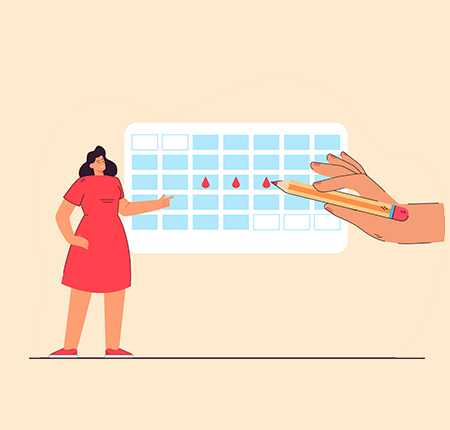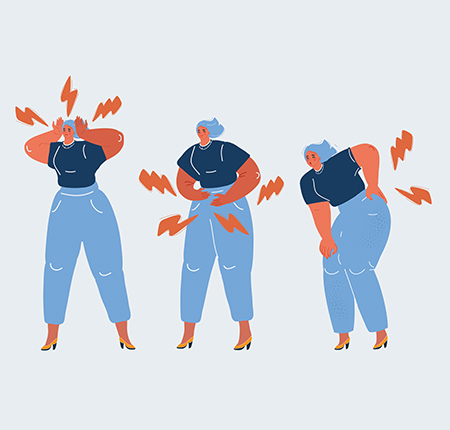
Even before your period starts, your body starts sending you some signals: an abdominal pain today, a mood swing tomorrow - for many women, these are easy signs every month, but for others, the days before your period can be very difficult . In any case, 3 out of 4 women have had premenstrual symptoms at least once in their life. And according to doctors, about 75% of menstruating people suffer from some signs of PMS. (Premenstrual syndrome)
What is premenstrual syndrome?
PMS is a combination of physical, behavioral and emotional symptoms that occur in a person during the premenstrual phase of the menstrual cycle - read more about each phase of the cycle here ! These symptoms can be in the form of food cravings, cramps, fatigue, breast pain, premenstrual bloating or feeling sick and mood swings.
If you've ever had these symptoms before your period, you too may be suffering from premenstrual syndrome – or PMS. And if you experience conditions that interfere with your day-to-day life well before your period — including work, school, and relationships — you may be suffering from premenstrual dysphoric disorder — or PMD.
What are the manifestations of the two? How do you tell them apart? What are the causes and what can you do to feel better each month? We talk about all of this in this article, so read on!
When does premenstrual syndrome (PMS) occur?
We wish we knew the exact answer too!! But the truth is that the moment when PMS appears differs from one woman to another. You can have symptoms a day before menstruation or you can have early symptoms, even after ovulation - after the first 14-16 days of the menstrual cycle, and they last until after menstruation begins. In some cases (the happier ones!) the symptoms may disappear the moment the bleeding starts.

Can premenstrual syndrome be different depending on age?
Yes! If you are between 30 and 40 years old and have felt a change compared to the past years, with mild premenstrual pain, you are not alone! Studies show that PMS symptoms can get worse as you approach menopause or transition into perimenopause.
For example, if you've ever cried before bed or started having insomnia, it's because your hormone levels change from year to year. In the years leading up to menopause, hormone levels can rise and fall unpredictably, causing more unpleasant symptoms, discomfort and fatigue.
Symptoms before menstruation
PMS symptoms usually range from mild to moderate or severe.
Did you know that almost 75% of women have one or more symptoms of PMS?
A smaller percentage - up to 30% of women have premenstrual symptoms that are moderate or severe. And 3-8% of menstruating people suffer from Premenstrual Dysphoric Disorder.
How severe your pre-period symptoms are can differ significantly from what your girlfriends feel. Moreover, the severity can fluctuate from one month to the next! And what you need to remember is that you don't have to have all the signs and symptoms of PMS at once to be affected by premenstrual pain and mood swings.
For example, for some people, insomnia occurs right before menstruation - which you can read more about on the blog. Apart from insomnia, symptoms can be emotional, behavioral and physical. Let's take them one at a time!
Premenstrual syndrome emotional & behavioral symptoms

Emotional and behavioral symptoms vary from person to person, and the most common are:
Anxiety
tension
Mood changes (irritability)
Depression
Food cravings or changes in appetite
Insomnia
Changes in libido, the way you perceive pleasure (about which I wrote more here https://enroush.ro/blog/hai-sa-vorbim-despre-ce-nu-te-excita )
Social distancing or the desire for isolation
Low attention
Physical symptoms of PMS
In addition to emotional ones, you can also have physical symptoms, such as:
Muscle and joint pain
Headache, headache
bloating
Fatigue
Acne
Diarrhea or constipation
Increased sensitivity and breast pain
Water retention
Abdominal pains
Cramps
Swollen hands or feet

It is possible to have dizziness as premenstrual syndrome, especially if proper hydration is ignored or you have a deficiency of certain vitamins and minerals in your body. In addition, some people also experience nausea before their period, which cannot be pleasant at all!
Can premenstrual syndrome influence other existing diseases?
Although it is not the rule, unfortunately, about half of women who have PMS also have another health problem that can worsen in the period before their period.
And most of the time, this health problem has symptoms common to premenstrual syndrome. Here are some of them:
Depression and anxiety disorders - or more common conditions that overlap with PMS, which may worsen before or during menstruation.
Myalgic encephalitis or chronic fatigue syndrome (CFS) - women who suffer from these may have heavier menstrual bleeding and early menopause
Irritable bowel syndrome - the condition causes cramping and bloating, and before your period, symptoms can get worse
Painful bladder syndrome - can cause more intense cramps
In addition, PMS can worsen asthma, allergies and migraines.
See a doctor if PMS mood swings or other symptoms start to affect your daily activities and health!
PMS - Causes & Risk Factors
Although PMS is so common and common, the exact cause is unknown. Current studies show that PMS occurs due to changes in neurotransmitters and hormones. Serotonin (neurotransmitter) fluctuation is one of these factors that can trigger PMS, because when serotonin is insufficient, it has an effect on the body and mental health, through depression, fatigue, insomnia and other conditions that we all know .
Moreover, there are risk factors that can worsen premenstrual symptoms, even if they do not cause them:
- Smoking
- Inactivity
- Lack of sleep
- Excessive alcohol consumption
- Eating too much salt, sugar or red meat
- Depression
- A period of intense stress
Also, see a doctor if you have endometriosis. Although it is a chronic condition without treatment, there are remedies that can relieve PMS symptoms during menstruation as well, such as hormone therapy. Read more about life with endometriosis in our article !
Diagnosing Premenstrual Syndrome
The diagnosis of premenstrual syndrome is not usually made through investigations or analyses, but through a consultation you have with your gynecologist about the symptoms that affect you monthly. For this, it is best to keep a symptom diary, in which you note the type, frequency, intensity and other details over several menstrual cycles, at least three. Moreover, your doctor can recommend a specialist consultation with an endocrinologist, to test the level of certain hormones at the beginning of the cycle and analyzes for possible thyroid dysfunctions.

Treatment of Premenstrual Syndrome
PMS symptoms improve differently for each person through lifestyle changes, but depending on their severity, some medications and treatments can help.
Antidepressants can improve mood swings, they are prescribed by a doctor.
Nonsteroidal anti-inflammatory drugs (such as ibuprofen) to relieve cramps.
Diuretics to reduce the symptoms of bloating and swelling, because they help to eliminate excess fluid.
Hormonal contraceptives - about which I wrote more here !
How can I treat PMS symptoms at home?
You can relieve some of the symptoms of PMS primarily through a healthy lifestyle, including:
Regular exercise
Food to provide you with vitamins, minerals and everything your body needs, avoiding excesses of caffeine, salt and sugar before menstruation
Observance of sleeping hours
Managing stress, depression and anxiety – cognitive-behavioral psychotherapy, yoga, massage, meditation, or other alternative methods (acupuncture)
Avoiding smoking

Will vitamins and dietary supplements help me treat PMS?
Before deciding what kind of vitamins or supplements to take, consult a doctor and make sure you have the necessary tests up to date to see where there is a deficiency. So far, studies show that calcium supplements (or foods that promote calcium production in the body) and vitamin B6 may be beneficial in relieving PMS. Naturally, you find B6 in foods such as fish, grains, or poultry. And magnesium can improve some symptoms (especially migraines), but studies are inconclusive. We recommend that you talk to your doctor before taking dietary supplements.
Tips & Recommendations - Relief of PMS symptoms
If you suffer from PMS, the chances of symptoms coming back each month may decrease over time, but they may not go away. Through diet, exercise, avoiding excess alcohol, caffeine, sugar and salt before your period - you can manage certain symptoms.
When should you go to the doctor?
Some people experience severe symptoms, especially when it comes to mental health, and if you're experiencing this every month, you may be going through more than just PMS. In medical terms, there is a less visible period condition that has a negative impact on your mental health: Premenstrual Dysphoric Disorder – and we recommend you see a doctor about it.
Premenstrual dysphoric disorder (PMD)
When PMS means more than cramps and sore breasts—and you're going through unexplained bouts of depression and anxiety every month, we can talk about premenstrual dysphoric disorder (PMD).
Premenstrual syndrome vs. premenstrual dysphoric disorder
Unlike PMS, the symptoms of PMDD are very severe, completely disrupting the lives of affected women by:
Depression
Increased anxiety
Persistent anger or irritability
Decreased interest in usual activities (work, school, hobbies)
Difficulty concentrating
Insomnia or hypersomnia
Physical symptoms similar to PMS
PMDD Symptoms & Diagnosis
Severe symptoms include panic attacks and suicidal thoughts. To establish an accurate diagnosis, the doctor may ask you about:
personal and family history of PMS, PMDD and other mental health conditions
family history of other health conditions, including hypothyroidism or endometriosis
He may also recommend a pelvic exam to rule out gynecological conditions, depending on your symptoms.
PMDD Causes & Treatment
The exact causes of PMDD are unknown and unfortunately there are no treatments, but improvements can be seen when you make lifestyle changes and see a psychotherapist.
You can keep severe symptoms under control by:
Stress reduction (eg, rearranging your schedule to reduce stress during the premenstrual week)
Cognitive-behavioral therapy
Administration of vitamin B6, calcium
Antidepressants
Hormonal therapy
Relaxation techniques (meditation, yoga)
Reducing or quitting smoking
Physical exercises
And during menstruation, our advice is to always choose safe, sustainable, natural and organic products that are not only practical and do not pollute nature, but also give you the comfort you need and the certainty that they will not cause irritation or infection.
We suggest you keep a menstrual diary in which you write down all the symptoms you have every month and call a specialist when they affect your daily life!























